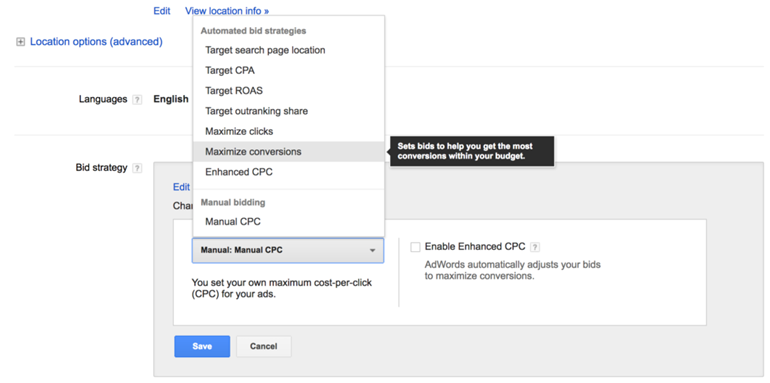Google Releases New Maximize Conversions Smart Bidding Strategy

Optimizing bids can be the bane of many PPC’ers. We use bid sheets, formulas, macros, and other fun strategies to ensure we are winning the auction and garnering conversions. Wouldn’t it be awesome if we could set up our AdWords campaigns to automatically optimize for conversions or a conversion value without having to do manual adjustments? That is what Google is attempting to do with their latest smart bidding strategy.
The maximize conversions smart bidding strategy automatically sets bids for each auction to get the most conversions for the daily budget. This is an exciting new bidding strategy to be testing, especially with how granular it can get.
The strategy uses a mix of relevant signals and machine learning to optimize conversions for every single auction through “auction-time bidding.” Unlike with manual bidding, the maximize conversions smart bidding strategy is not bound to aggregate data. Instead, it sets bids for each individual auction, tailoring the bids to the user’s search context as well as the signals present at auction time. These signals could include remarketing lists, the time of day, the ad creative being shown, the user’s device, their location, what browser they are using, and even their operating system.
By optimizing bids on an auction-to-auction basis, the strategy can automatically optimize to a higher degree of precision, leading to increases in conversion volume and decreases in CPA, as reported by luxury decking company Trex. Implementing the strategy is easy enough. Go to the campaigns settings, and update your current strategy to the new maximize conversions strategy.

While this new bidding strategy shows promise and would be smart to test, if you are currently running on manual bidding there is one major drawback. When you switch to an automatic bidding strategy you have less control over the account and your bidding, as well as less data for troubleshooting. For instance, if the automatic bidding strategy started to go south, you wouldn’t be able to analyze the data as closely as you would with a manual strategy. So, for those of you who like having complete control over your accounts, this strategy might not be your favorite.
Overall, this is an interesting new smart strategy coming from Google. With the strategy’s ability to tweak bids on an auction-by-auction basis using user context, it lends itself to being a successful strategy to implement, as seen in the results from Trex. I definitely recommend testing to see if it improves your conversion volume. Like with any testing, though, try on a few campaigns first before scaling out.
Have you tried the new conversion strategy yet? What have your results been? Reach out to me on Twitter and let me know!



